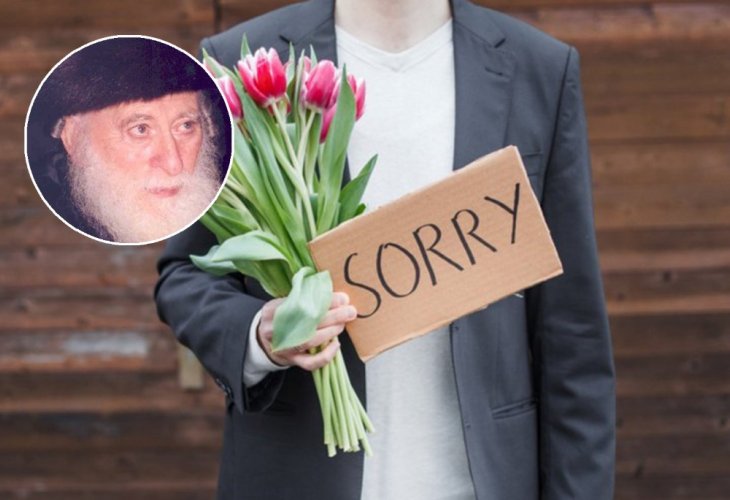Personal Stories
A Rabbi’s Journey of Repentance and the Healing Power of Forgiveness
A powerful story about the lasting impact of our actions and the journey of seeking forgiveness.

Rabbi Chaim Moshe, the head of the 'Birkat HaTorah' yeshiva in one of Europe's well-known Jewish communities, found himself facing a serious illness. His students prayed for him, while the Rosh Yeshiva (head of the yeshiva) reflected deeply on his deeds and prepared for his transition to the world to come. In this world, doctors ran frequent tests and recommended various treatments, but his condition seemed to worsen, and couldn't see any improvement. The doctors were unable to explain the worsening of his condition..
The news about the Rosh Yeshiva’s condition quickly reached Torah leaders in Israel. Nathaniel, a former student of the yeshiva now living in Jerusalem, went to seek a blessing for the Rosh Yeshiva’s recovery from the Rachmastrivka Rebbe, Rabbi Israel Mordechai Twersky. The Rebbe listened carefully, and his face grew pained as he responded: “Tell the sick man that he must repent.”
Nathaniel was taken aback, feeling as though a heavy weight had been dropped on him.. He couldn’t fathom delivering such a message to his teacher, a man of great wisdom and virtue. But after gathering his courage, Nathaniel explained to the Rebbe that the Rosh Yeshiva was an exceptional scholar and surely had already repented and examined his deeds. To his surprise, the Rebbe repeated, with emphasis: “Tell him that he must make complete repentance.” Nathaniel realized this was no small matter and understood it would not be easy to deliver such a message.
With a heavy heart, Nathaniel called the Rosh Yeshiva, far away in Europe, to deliver the Rebbe’s message. The Rosh Yeshiva, after a moment of deep reflection, thanked his student for bringing the message but was puzzled. He thought to himself, “I’ve had plenty of time to repent. I’ve reflected on my Torah study, my prayers, and my character. What else could I be missing?”
Suddenly, the Rosh Yeshiva remembered something that had happened not long ago. He had been approached by a community member who asked him to mediate a painful family matter that had reached the local court. Reluctantly, the Rosh Yeshiva became involved in the matter, doing his best to help resolve it. However, his actions had left one side hurt and disappointed. The Rosh Yeshiva was struck by a difficult thought: “Could this be what the Rebbe meant? Have I caused harm that still needs to be addressed?”
Realizing the depth of the issue, the Rosh Yeshiva immediately called the person he had hurt, intending to apologize and mend the relationship. The man, deeply hurt by the situation, listened to the Rosh Yeshiva's words but was hesitant at first. Yet, when he heard that the Rosh Yeshiva’s condition had taken such a turn, he agreed to forgive him. The Rosh Yeshiva, relieved, called Nathaniel to report that he had followed the Rebbe’s guidance and asked forgiveness, feeling at peace with his actions.
Nathaniel then returned to the Rebbe to deliver the news, but the Rebbe was not satisfied. “He asked forgiveness from a Jew, but not from his neighbor,” the Rebbe said, shaking his head. Nathaniel was stunned. The Rebbe’s meaning became clear: the Rosh Yeshiva had apologized to the person he had wronged, but he still needed to ask forgiveness from someone else, someone closer, a neighbor who had been deeply hurt by his actions many years before.
It was then that the Rosh Yeshiva remembered the Cohen family—a family he had forced to leave the neighborhood many years ago. Rabbi Chaim Moshe had been young at the time, and his actions, though well-intentioned, had caused great harm to the Cohen family, who had been forced to move, leaving behind damaged reputations and lost opportunities.
The Rosh Yeshiva knew he had to find the Cohen family, even though it had been decades since they left. His search was not easy, but he didn’t give up, understanding that his life depended on making amends. After an intensive search, he finally located the family in a small Jewish community.
The Rosh Yeshiva traveled to the family’s home, feeling the weight of the task before him. Rabbi Levi Cohen, the patriarch of the family, was now an elderly man, his face marked by the pain of years spent dealing with the consequences of the Rosh Yeshiva’s actions.
Upon seeing the Rosh Yeshiva, Rabbi Levi’s face remained stern. “You ruined our lives! Now you're coming to ask for forgiveness?” he cried out in pain and anger.
The Rosh Yeshiva, broken and exhausted, covered his face with his hands and wept. After a long silence, he finally spoke: “Rabbi Levi, I know I don’t deserve your forgiveness. I made a terrible mistake when I was young. I’ve paid a heavy price for it. My body is broken, and I don’t have much time left. But I came here today because one of the greatest Torah sages of our time told me, with divine inspiration, that my illness is a consequence of the wrong I did. Would you be willing to forgive me?”
Rabbi Levi softened slightly but still struggled with the depth of the pain. “I don’t know if I can ever fully forgive you, but for your healing, I forgive you with a whole heart,” he said, his voice filled with courage.
Soon after this meeting, the Rosh Yeshiva’s health began to improve. The doctors were amazed to see a turn in his condition, and recovery seemed closer than ever. The power of repentance, humility, and seeking forgiveness had worked its miracle.

